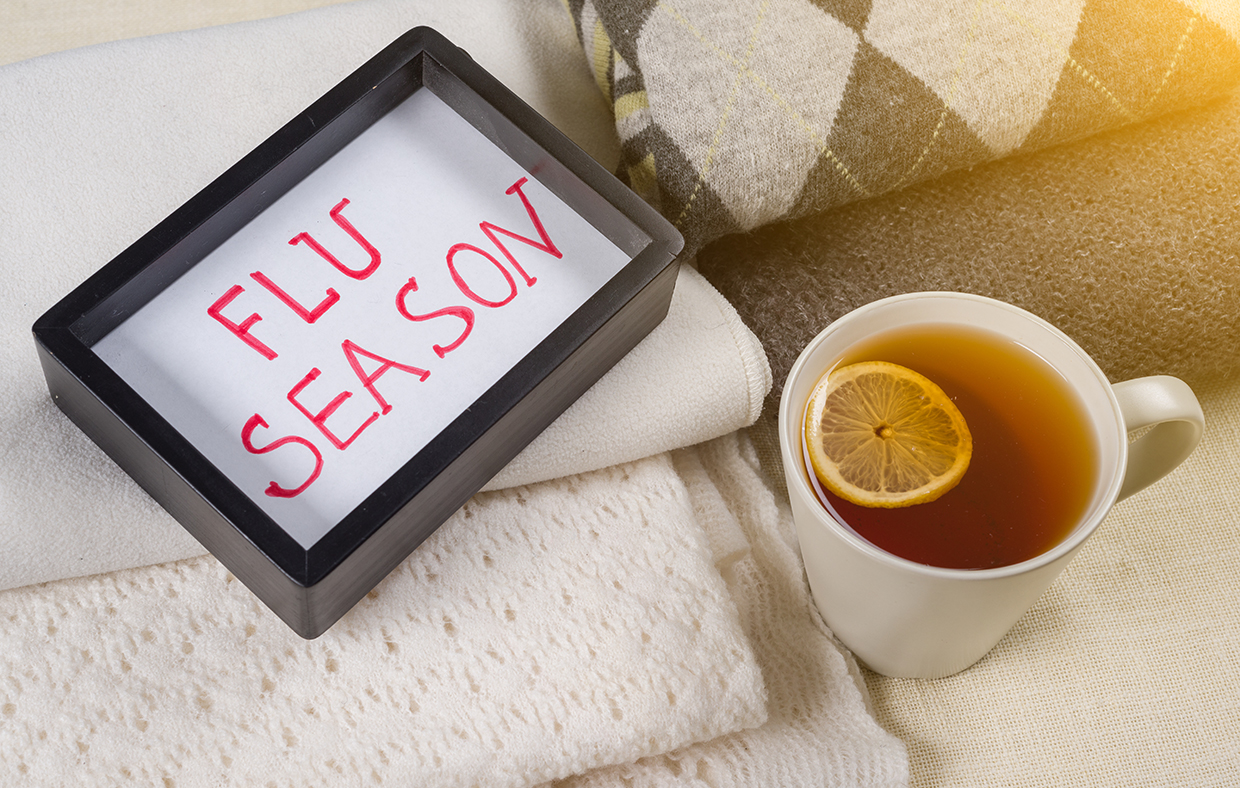Flu season is here.
Fall is in the air, and with it come good things like the new school year, apple picking, and autumn colors—but also the seasonal uptick in viruses like colds, COVID-19, and influenza, commonly known as the flu.
Locally, flu season typically begins in October and continues through early spring. The flu is a contagious respiratory illness that can cause mild to severe sickness, with symptoms such as fever, cough, sore throat, runny or stuffy nose, muscle or body aches, headaches, fatigue, and nausea or vomiting. Although flu symptoms may resemble those of the common cold, the flu is more serious and can lead to complications such as pneumonia and sometimes death, particularly for people in high-risk groups. When all of us take actions to prevent the spread of the flu, we can help to keep our community safe.
The importance of the flu vaccine
The most effective way to prepare for flu season is to get vaccinated. The Centers for Disease Control and Prevention (CDC) recommends that everyone six months and older receive an annual flu vaccine. Flu vaccines are formulated based on which flu strains are expected to be most prevalent in the upcoming flu season. Because the flu virus changes over time, getting vaccinated each year is the best way to protect yourself and others. Although the flu vaccine does not always prevent infection, it can reduce the severity of the illness and decrease the likelihood that you will spread the flu to others.
The flu vaccine is especially important for people who are at higher risk of severe illness, including young children, older adults, pregnant women, and people with chronic health conditions. Immunization is also important for people who work in healthcare and those frequently exposed to large groups, such as teachers, those in retail, and people who work in food and hospitality. Even if you are young and healthy, getting vaccinated against the flu is important for personal and community health. It reduces your risk of getting the flu, decreases your risk of serious symptoms, and contributes to herd immunity, reducing the spread of the flu overall, which protects people who are vulnerable to severe complications.
Most health insurance plans cover the cost of the flu vaccine. For those without insurance, community health centers like MCHC Health Centers (MCHC) provide flu vaccines at no cost. I recommend getting vaccinated by the end of October, but it is better to get vaccinated at any point during flu season than not to get vaccinated at all.
There is a misconception that the flu vaccine can give you the flu, but flu vaccines cannot cause the flu; none of the flu vaccines contain live viruses that can cause illness. Some people may experience mild side effects such as a sore arm, headache, or low-grade fever, but these are normal immune responses and typically don’t last long.
COVID-19 vaccination can contribute to a healthier fall
The fall is also an important time to be vaccinated against COVID-19. The CDC recommends everyone six months and older receive a dose of the updated 2024-2025 COVID vaccine. You can stagger your COVID and flu vaccines or receive them at the same time.
The COVID vaccine is crucial even after an infection to bolster immunity and protect against reinfection, as natural immunity against COVID wanes over time. The CDC recommends waiting three months after a COVID infection to get the most recent COVID vaccine. Talk with your medical provider if you have concerns about potential side effects, vaccine efficacy, or when you should be vaccinated.
What to do if you get the flu
If you think you have the flu, stay hydrated and get plenty of rest. The flu is most contagious during the first three days. Stay home and keep your distance from others when possible. If you must be in contact with people, consider wearing a mask. For mild cases, rest and over-the-counter medications such as decongestants and pain relievers can alleviate symptoms. Regular handwashing with soap and water, using hand sanitizer when soap is not available, and covering up when coughing or sneezing help to reduce the spread.
If you are at high risk and think you have the flu, contact your medical provider to get tested. If you test positive, your provider may prescribe an antiviral medication like Tamiflu (oseltamivir). These medications are most effective when taken within the first few days of showing symptoms, so it is important to see your medical provider promptly. Regardless of your risk level, contact a medical provider if you experience severe symptoms such as difficulty breathing, chest pain, or persistent dizziness.
As we continue to navigate the challenges of the flu in addition to other circulating viruses like COVID-19, receiving the flu vaccine and working to stop the spread can help our community stay healthy.
Omar Ibarra, PA-C is a primary care medical provider at MCHC Health Centers, which includes Hillside Health Center and Dora Street Health Center in Ukiah, Little Lake Health Center in Willits, and Lakeview Health Center in Lakeport. MCHC is a community-based and patient-directed organization that provides comprehensive primary healthcare services as well as supportive services such as education and translation that promote access to healthcare.

 MyChart Login
MyChart Login

